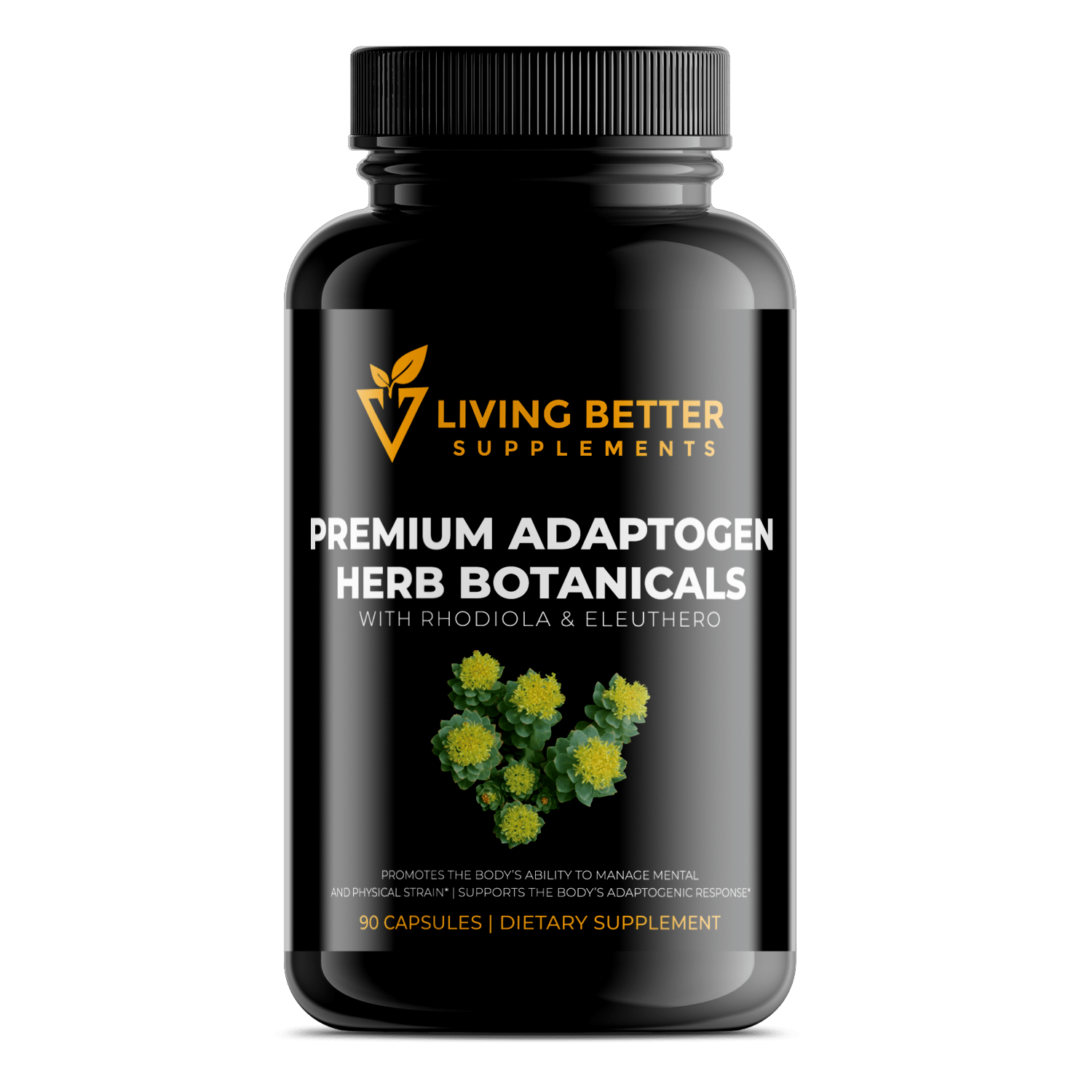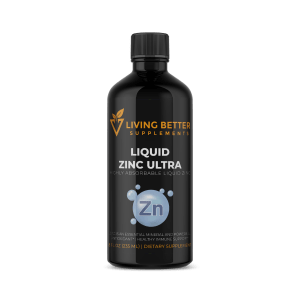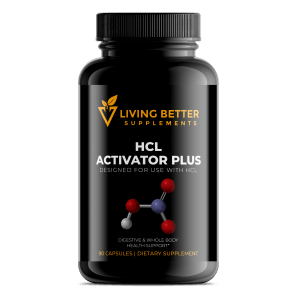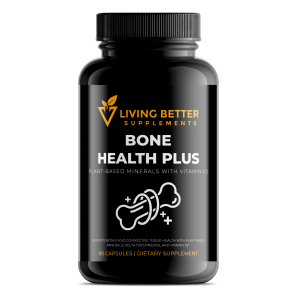| Formula Purposes & Benefits |
| Premium Adaptogen Herb Botanicals is developed based on cutting-edge scientific research and expert formulation to support healthy stress management, fatigue relief, healthy cognitive function, mental stamina, physical stamina, and positive mood.
Optimal for physicians looking to provide their clients with effective stress management and combat fatigue. This powerful formula combines renowned adaptogenic herbs, Rhodiola rosea and Eleutherococcus, with the added benefits of Maca. Supporting a healthy mindset, Premium Adaptogen Herb Botanicals empowers individuals facing occasional stress, making it an excellent choice for busy, type A personalities or anyone seeking quality stress support. Our formula is proudly made in the USA in an FDA registered facility, following Good Manufacturing Practices (GMP) standards. Our commitment to excellence is reflected in the fact that only 4% of the supplements on the market can match our world-class standards. |
| Formula Ingredient Deck | Benefits Of Each Ingredient |
| Rhodiola Rosea extract |
.
|
| Organic Turmeric |
|
| Eleuthero (root) |
|
| Organic Prickly Pear Leaf |
|
| Organic Ceylon Cinnamon (bark) |
|
| Organic Macca root |
|
| Organic Fermented Cordyceps |
|
| Proper Use of This Supplement |
| Suggested Use: Take 3 capsules at breakfast or before 2 P.M. or as directed by a health professional. |
| Our Formula | Vs Other Formulas on the Market. |
| 1. Our formula is GMP certified, and made in an FDA registered facility. | 1. Source cheap ingredients from heavily polluted soils. |
| 2. High quality adaptogenic nutraceuticals in a bioavailable and efficaciously dosed formula. | 2. Uses cheap sources of adaptogenic nutraceuticals that may have heavy metals due to poor product quality. |
12. Dording, C. M., Schettler, P. J., Dalton, E. D., Parkin, S. R., Walker, R. S., Fehling, K. B., Fava, M., & Mischoulon, D. (2015). A double-blind placebo-controlled trial of maca root as treatment for antidepressant-induced sexual dysfunction in women. Evidence-based complementary and alternative medicine : eCAM, 2015, 949036. https://doi.org/10.1155/2015/949036
13.Pu, W. L., Zhang, M. Y., Bai, R. Y., Sun, L. K., Li, W. H., Yu, Y. L., Zhang, Y., Song, L., Wang, Z. X., Peng, Y. F., Shi, H., Zhou, K., & Li, T. X. (2020). Anti-inflammatory effects of Rhodiola rosea L.: A review. Biomedicine & pharmacotherapy = Biomedecine & pharmacotherapie, 121, 109552. https://doi.org/10.1016/j.biopha.2019.109552
117. Chilelli, N. C., Ragazzi, E., Valentini, R., Cosma, C., Ferraresso, S., Lapolla, A., & Sartore, G. (2016). Curcumin and Boswellia serrata Modulate the Glyco-Oxidative Status and Lipo-Oxidation in Master Athletes. Nutrients, 8(11), 745. https://doi.org/10.3390/nu8110745
118. Barzegar, A., & Moosavi-Movahedi, A. A. (2011). Intracellular ROS protection efficiency and free radical-scavenging activity of curcumin. PloS one, 6(10), e26012. https://doi.org/10.1371/journal.pone.0026012
119. Banik, U., Parasuraman, S., Adhikary, A. K., & Othman, N. H. (2017). Curcumin: the spicy modulator of breast carcinogenesis. Journal of experimental & clinical cancer research : CR, 36(1), 98. https://doi.org/10.1186/s13046-017-0566-5
120. Suhett, L. G., de Miranda Monteiro Santos, R., Silveira, B., Leal, A., de Brito, A., de Novaes, J. F., & Lucia, C. (2021). Effects of curcumin supplementation on sport and physical exercise: a systematic review. Critical reviews in food science and nutrition, 61(6), 946–958. https://doi.org/10.1080/10408398.2020.1749025
121. Pivari, F., Mingione, A., Brasacchio, C., & Soldati, L. (2019). Curcumin and Type 2 Diabetes Mellitus: Prevention and Treatment. Nutrients, 11(8), 1837. https://doi.org/10.3390/nu11081837
122. Ashtary-Larky, D., Rezaei Kelishadi, M., Bagheri, R., Moosavian, S. P., Wong, A., Davoodi, S. H., Khalili, P., Dutheil, F., Suzuki, K., & Asbaghi, O. (2021). The Effects of Nano-Curcumin Supplementation on Risk Factors for Cardiovascular Disease: A GRADE-Assessed Systematic Review and Meta-Analysis of Clinical Trials. Antioxidants (Basel, Switzerland), 10(7), 1015. https://doi.org/10.3390/antiox10071015
123. Mata, I., Mata, S., Menezes, R., Faccioli, L. S., Bandeira, K. K., & Bosco, S. (2020). Benefits of turmeric supplementation for skin health in chronic diseases: a systematic review. Critical reviews in food science and nutrition, 1–15. Advance online publication. https://doi.org/10.1080/10408398.2020.1798353
166. Hariri, M., & Ghiasvand, R. (2016). Cinnamon and Chronic Diseases. Advances in experimental medicine and biology, 929, 1–24. https://doi.org/10.1007/978-3-319-41342-6_1
368. Tesoriere, L., Butera, D., Pintaudi, A. M., Allegra, M., & Livrea, M. A. (2004). Supplementation with cactus pear (Opuntia ficus-indica) fruit decreases oxidative stress in healthy humans: a comparative study with vitamin C. The American journal of clinical nutrition, 80(2), 391–395. https://doi.org/10.1093/ajcn/80.2.39





